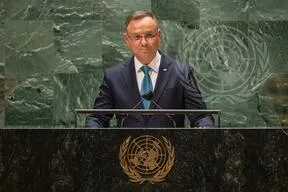Statement
Statement summary
ANDRZEJ DUDA, President of Poland, said the Secretary-General’s report, Our Common Agenda, provides a comprehensive response to the world’s most pressing challenges, from climate change to COVID-19 recovery. Highlighting Poland’s efforts to overcome the pandemic’s impact, he said 75,000 citizens lost their lives and 3 million of its 38 million people have contracted the virus, including himself. While its robust economy has recovered in 2021, a year ago Poland failed to record economic growth for the first time in 30 years, which affected millions of families. Indeed, the fight against the pandemic conjured a word well known in the nation: solidarity, referring to Poland’s history, when workers established a large independent trade union in 1980 that went on strike against the communist regime. A symbolic guiding principle of Poland’s policy and ideal, the word emerges in the context of COVID-19, he said, doubting that the world had showed enough solidarity to fight the virus.
Recalling that at the pandemic’s outbreak borders re-emerged in Europe and the world hoped for a vaccine, he said that almost two years later, with more than 4.5 million casualties, States should answer the question about how well they passed the solidarity test. Saluting those who won the vaccine battle in laboratories around the world, he questioned whether access to doses has been fair and whether efforts of nations like Poland were enough in ensuring their distribution, along with medical supplies and personnel, to all countries in need. The word “solidarity” does not refer exclusively to the pandemic, he said, turning to other concerns, including the right to self-determination and to democratic governance, enshrined in the International Covenant on Civil and Political Rights. Indeed, the pandemic has blurred attention paid to multiple misfortunes plaguing some countries, including Belarus, Libya, Syria and Ukraine.
Yet, solidarity comes at a price because regimes tend to defend themselves not only against their own citizens but also against democratic States, he said. However, the world did not come to a standstill during the pandemic, which has not deprived nations of their democratic aspirations, stifled people’s desire to live in freedom or suppressed the craving for dignity and respect. Recalling Moldovan voters who took power away from the oligarchs plundering their country and voted in favour of reforms and democracy, he said such moments restore faith in the most fundamental values of humanity and inspire profound solidarity in other countries. The experience of sharing the same planet teaches nations coexistence, he stated, adding that international law is a framework to do so while being one of the greatest achievements of modern times. Debating United Nations reform always centres on one thing: how to promote the Organization’s role in securing the primacy of international law “because we want to live in a world founded on law, not on force”, he said, pledging Poland’s commitment to this critical issue.
Noting that the pandemic has blurred another major topic — the fight against climate change — he asked: “Do we, the rich North, pass the test of solidarity, or do we merely cater to our own statistics by relocating production to the poorer countries of the South where least environment friendly technologies are applied, and then those countries are blamed for contaminating the planet?” Citing Poland’s tremendous progress since overthrowing communism, he said that between 1988 and 2016 carbon dioxide emissions fell by more than 30 per cent. The share of hard coal in its energy mix is decreasing, biofuels and renewable energy sources are gaining ground, and more achievements are ahead, including the finalization of the Katowice Rulebook, which streamlines the implementation of the Paris Agreement, and the Energy Policy of Poland until 2040. In closing, he said solidarity has not ceased to exist in the face of a pandemic. It should continue to be the world’s motto and central tenet not to compromise on human rights and the rights of entire nations, to secure the development of the United Nations and to be ready to set and pursue ambitious goals in the struggle to protect the planet.

